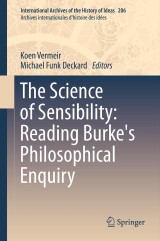Details

The Science of Sensibility: Reading Burke's Philosophical Enquiry
International Archives of the History of Ideas Archives internationales d'histoire des idées, Band 206
|
CHF 118.00 |
|
| Verlag: | Springer |
| Format: | |
| Veröffentl.: | 08.11.2011 |
| ISBN/EAN: | 9789400721029 |
| Sprache: | englisch |
| Anzahl Seiten: | 338 |
Dieses eBook enthält ein Wasserzeichen.
Beschreibungen
Attracting philosophers, politicians, artists as well as the educated reader, Edmund Burke’s <i>Philosophical Enquiry</i>, first published in 1757, was a milestone in western thinking. This edited volume will take the 250th anniversary of the <i>Philosophical Enquiry </i>as an occasion to reassess Burke’s prominence in the history of ideas. Situated on the threshold between early modern philosophy and the Enlightenment, Burke’s oeuvre combines reflections on aesthetics, politics and the sciences. This collection is the first book length work devoted primarily to Burke’s <i>Philosophical Enquiry</i> in both its historical context and for its contemporary relevance. It will establish the fact that the <i>Enquiry</i> is an important philosophical and literary work in its own right.
Preface: Edmund Burke’s Philosophical Enquiry in context, M.F. Deckard, K. Vermeir.- Part 1: Science and Sensibility.- Philosophical Enquiries into the Science of Sensibility: An Introductory Essay, K. Vermeir, M.F. Deckard.- 'Communicating a Sort of Philosophical Solidity to Taste’: Newtonian Elements in Burke’s Methodology in Philosophical Enquiry, S. Ducheyne.- Hyporborean Meteorologies of Culture: Art’s Progress and Medical Environmentalism in Arbuthnot, Burke and Barr, A. Sarafianos.- From the Enquiry (1757) to the Fourth Kritisches Wäldchen (1769): Burke and Herder on the Division of the Senses, H. Parret.- Edmund Burke and John Locke on the Metaphysics of Substance, J. Pappin III.- Part 2: Sensibility in Politics, Sociability and Morals.- The Politics of Burke’s Enquiry, F.P. Lock.- Aisling Gheár – A Terrible Beauty: The Gaelic Background to Burke's Enquiry, K. O’Donnell.- Pity and Fear: Providential Sociability in Burke’s Philosophical Enquiry, R. Bourke.- Burke and Kant on the Social Nature of Aesthetic Experience, B. Vandenabeele.- The Sublime, the Beautiful, and the Political in Burke’s Work, D.I. O’Neill.- Part 3: Aesthetics and the Science of Sensibility.- Burke’s Classical Heritage: Playing Games with Longinus, C. Ryan.- Edmund Burke among the Poets: Milton, Lucretius and the Philosophical Enquiry, P. Bullard.- ‘Expressive Uncertainty’: Edmund Burke’s Theory of the Sublime and Eighteenth-Century Conceptions of Metaphor, F. De Bruyn.- Between Knowledge and Sentiment: Burke and Hume on Taste, D. Perinetti.- Burke, the Revenge of Obscurity and the Foundation of the Aesthetic, B.S. Girons.
<p>Michael Funk Deckard is assistant professor of philosophy at Lenoir-Rhyne University (North Carolina). After completing his PhD in 2007 entitled, ‘Edmund Burke on Beauty and the Sublime: Taste and Passions in Eighteenth-Century Aesthetics’, he has ventured into the work of contemporary author J. M. Coetzee, French phenomenologist Paul Ricoeur, the philosophy of music, the relationship of science and religion, medical ethics, and the ethics of war and peace. He has also co-edited (with Péter Losonczi) <i>Philosophy Begins in Wonder: An Introduction to Early-Modern Philosophy, Theology, and Science. </i></p><p><i></p><p><p>Koen Vermeir (CNRS) is a Senior Researcher at the <i>Centre National de Recherche Scientifique</i> (CNRS), Laboratoire SPHERE, UMR 7219, Paris, France. He also directs the <i>Leuven Interdisciplinary Platform for the Study of the Sciences. </i>A specialist in history of science and history of philosophy, his main interests are in the history of the early modern imagination, in the interaction between religion and technology, and in early modern aesthetics. After his studies in theoretical physics, philosophy and history of science, he held research positions at the Fund of Scientific Research (Flanders), the Max-Planck-Institute for the History of Science, Cambridge University, Cornell University, Harvard University and the Radcliffe Institute for Advanced Studies. Vermeir has published three books on aesthetics and various special issues, articles and book chapters on topics in history of science and philosophy.</p>
<p>Attracting philosophers, politicians, artists as well as the educated reader, Edmund Burke’s <i>Philosophical Enquiry into the Origin of Our Ideas of the Sublime and Beautiful</i>, first published in 1757, was a milestone in western thinking. Situated on the threshold between early modern philosophy and the Enlightenment, Burke’s oeuvre combines reflections on aesthetics, politics and the sciences. In the eighteenth century, these domains were connected by the key notion of sensibility, which structured debates not only in physiology, epistemology and psychology, but also in the arts and in politics. This notion referred to an organic sensitivity depending on the nervous structure of the human body. At the same time, however, sensibility denoted subtle moral and aesthetic perceptions, an acuteness of emotional and physical feeling and the susceptibility to delicate or powerful passionate arousal. <i>The Science of Sensibility</i> interprets Burke’s <i>Philosophical Enquiry </i>as an important contribution to this culture of sensibility and places this seminal work in its broader historical and philosophical context.</p>Authors in this collection come from various disciplines and give a manifold of perspectives on Burke’s <i>Philosophical Enquiry</i>, including approaches from art history, classics, English literature, cultural history, history of science, philosophy, political science, Irish studies, cultural studies and feminist studies. Confronting established fields with new disciplines and sub-disciplines, this edited volume reassesses Burke’s prominence in the history of ideas. <i>The Science of Sensibility</i> is the first book length work devoted primarily to Burke’s <i>Philosophical Enquiry</i> in both its historical context and for its contemporary relevance
First book to establish the historical, philosophical, literary, scientific importance of the Philosophical Enquiry as an independent work A long overdue ‘state of the art’ of current Burke scholarship’ Provides reviously unpublished original reading of the Philosophical Enquiry

















